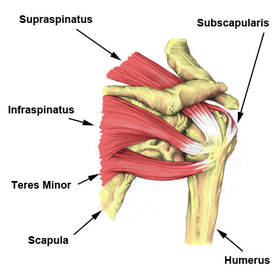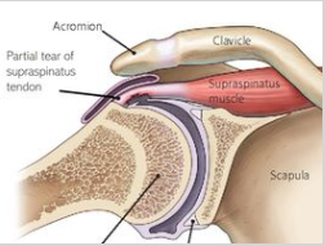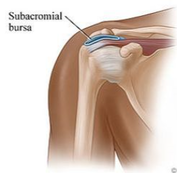Rotator Cuff Tears
The rotator cuff is the group of tendons and muscles that connect the upper arm (ball) to the shoulder blade (socket) providing stability and allowing the 'ball' to remain centered in the socket during activities such as lifting.

There are a number of conditions that can affect the rotator cuff, all with similar signs and symptoms. Your physiotherapist can help determine the exact nature of your rotator cuff condition to ensure you get the most appropriate management at the right time.
The Ageing Tendon
The rotator cuff tendons are an area of the body that is prone to wear and tear with increasing age. This wear and tear can lead to tendon changes ("tendinosis") that may affect the strength of the tendons, making them more prone to developing small tears (like fraying) over time. In many cases tendinosis and rotator cuff tears that occur over time are not painful, and many people do not even know they have them. However, in some people, symptoms can develop for no apparent reason, or sometimes following sudden bursts of unaccustomed, repetitive activity such as pruning a hedge, or sometimes after mild trauma or lifting activities.
These types of tears may not heal, but it is important to know that the symptoms often down with time and appropriate treatment, even though the underlying wear and tear on the tendon may remain unchanged. We know from recent research that around 50% of these types of tears will settle down with appropriate treatment, and 70-85% of patients report good results from rehabilitation, without the need for surgery.
Acute Tendon Injury
If you have had a significant traumatic event such as a shoulder dislocation, a very heavy lifting injury or heavy fall, it is possible to sustain a tear of the rotator cuff, with or without underlying wear and tear on the tendon. These types of tears are usually immediately painful and, under some circumstances, may need an orthopaedic opinion. Your physiotherapist will be able to assess your shoulder, request any imaging investigations if necessary, and advise you on the best course of action.
In either of these types of rotator cuff conditions, a physiotherapy assessment is recommended, to ensure you receive the best management for your condition, that will give you the best result over time.
The Ageing Tendon
The rotator cuff tendons are an area of the body that is prone to wear and tear with increasing age. This wear and tear can lead to tendon changes ("tendinosis") that may affect the strength of the tendons, making them more prone to developing small tears (like fraying) over time. In many cases tendinosis and rotator cuff tears that occur over time are not painful, and many people do not even know they have them. However, in some people, symptoms can develop for no apparent reason, or sometimes following sudden bursts of unaccustomed, repetitive activity such as pruning a hedge, or sometimes after mild trauma or lifting activities.
These types of tears may not heal, but it is important to know that the symptoms often down with time and appropriate treatment, even though the underlying wear and tear on the tendon may remain unchanged. We know from recent research that around 50% of these types of tears will settle down with appropriate treatment, and 70-85% of patients report good results from rehabilitation, without the need for surgery.
Acute Tendon Injury
If you have had a significant traumatic event such as a shoulder dislocation, a very heavy lifting injury or heavy fall, it is possible to sustain a tear of the rotator cuff, with or without underlying wear and tear on the tendon. These types of tears are usually immediately painful and, under some circumstances, may need an orthopaedic opinion. Your physiotherapist will be able to assess your shoulder, request any imaging investigations if necessary, and advise you on the best course of action.
In either of these types of rotator cuff conditions, a physiotherapy assessment is recommended, to ensure you receive the best management for your condition, that will give you the best result over time.
|
Bursitis"
Bursitis is inflammation of the bursa that overlies one of the rotator cuff tendons (supraspinatus). It is common for this to be reported on ultrasound scans and is not always a cause of pain. Your physiotherapist will be able to explain the significance of this finding if you are concerned. |
"Tendinosis" or "Tendinopathy"
This is the age-related changes that occur in a tendon over time. Ageing can affect the tendon structure and strength. Tendinopathy can also be associated with things that affect tendon health, such as lifestyle factors including smoking, alcohol consumption and lack of physical activity.
"Calcific Tendinopathy" is a different condition. Click the link to read more about this condition.

Partial or full thickness tear
A partial tear is when the tendon develops a tear that extends only part-way through the vertical distance of the tendon. These are common with increasing age.
A full-thickness tear is when the tendon develops a tear that extends through the vertical height of the tendon from top to bottom. These may be small (only 1-2 mm in size), or may extend to involve more of the tendon. Full thickness tears are common with increasing age. One in four people over the age of 65 years, and one in two people over the age of 80 years have a full-thickness tear without pain.
Some tears may need orthopaedic evaluation in the early stages following injury, especially if there has been a significant traumatic event. Your physiotherapist will be able to assess your shoulder and advise you.
What Will the Physiotherapist Do?
Your physiotherapist will first assess the nature of your problem to find out when and how the pain started. They will then test the movement and strength of your shoulder. If necessary, they can arrange scans to investigate the nature of the rotator cuff problem. Treatment options will then be explained and advice given on activities to continue, or to avoid, pain management and some exercises may be prescribed.
Your physiotherapist will first assess the nature of your problem to find out when and how the pain started. They will then test the movement and strength of your shoulder. If necessary, they can arrange scans to investigate the nature of the rotator cuff problem. Treatment options will then be explained and advice given on activities to continue, or to avoid, pain management and some exercises may be prescribed.
What are my treatment options for a rotator cuff tear?
If you have bursitis, tendinosis or a tear is not the result of a significant injury, the initial treatment may be non-surgical and will cover rest and gentle exercise to regain strength and mobility. If pain is significant, analgesia and anti-inflammatory medications may be prescribed by your GP. Steroid injections may be considered in some cases if pain cannot be adequately controlled by other means.
If the tear is a result of a trauma or if the problem is not greatly improved by non-surgical means, then an orthopaedic evaluation may be recommended to discuss other treatment options including the possibility of surgery.
For more information on rotator cuff tears and their treatment, please get in touch with Advance Physiotherapy to arrange a consultation.
What are my treatment options for a rotator cuff tear?
If you have bursitis, tendinosis or a tear is not the result of a significant injury, the initial treatment may be non-surgical and will cover rest and gentle exercise to regain strength and mobility. If pain is significant, analgesia and anti-inflammatory medications may be prescribed by your GP. Steroid injections may be considered in some cases if pain cannot be adequately controlled by other means.
If the tear is a result of a trauma or if the problem is not greatly improved by non-surgical means, then an orthopaedic evaluation may be recommended to discuss other treatment options including the possibility of surgery.
For more information on rotator cuff tears and their treatment, please get in touch with Advance Physiotherapy to arrange a consultation.
